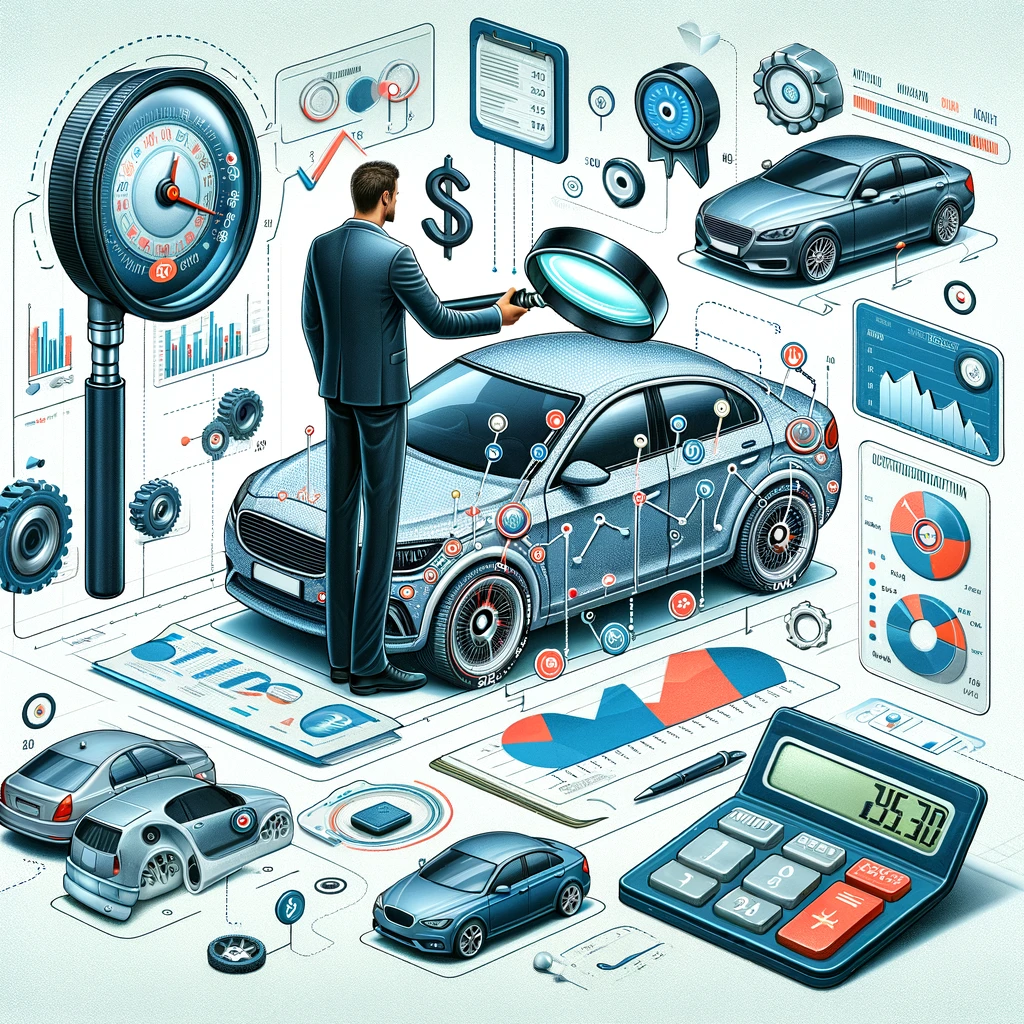
What Is My Car’s Value?
Introduction
Understanding the value of your car is crucial whether you’re planning to sell, trade, or simply gauge its depreciation for personal knowledge. This blog post will guide you through the factors that influence car value, how to determine it, and tips on maximizing resale value. Determining the value of your car is a fundamental step, whether you intend to sell it, trade it in, or even just have a better understanding of its depreciation for your own information. This comprehensive guide will walk you through various critical factors that can affect your car’s value.
These factors include the make and model of the vehicle, its age, mileage, overall condition, market demand for similar cars, and any additional features or upgrades it may have. By analyzing these key elements, you will be able to calculate a fair and accurate value for your car.
Furthermore, this post will provide you with valuable tips and strategies on how to enhance the resale value of your vehicle, such as keeping up with routine maintenance, addressing any necessary repairs, and presenting your car in the best possible light when it comes time to sell. Understanding the intricacies of how car values are determined and implementing smart practices to maintain and potentially increase your car’s worth can ultimately be financially advantageous and rewarding.
Factors Influencing Car Value
Make and Model
- Popularity: Some models hold their value better due to demand.
When determining the value of a car, various factors come into play that can significantly influence its worth in the market. One crucial aspect is the make and model of the vehicle. The popularity of a specific make or model can impact its resale value, with certain models holding their value better than others due to higher demand. Additionally, the reliability of a car plays a key role in how it depreciates over time, as vehicles known for their durability tend to retain their value better than those with a reputation for frequent issues.
- Reliability: Cars known for durability tend to depreciate slower.
Age and Mileage
- Depreciation: New cars lose value rapidly in the first few years.
Another important consideration is the age and mileage of the car. New cars typically experience rapid depreciation in the first few years of ownership, with the rate of depreciation slowing down as the vehicle ages. Higher mileage generally translates to lower value, as it indicates increased wear and tear on the vehicle’s components.
- Mileage: Higher mileage generally means lower value due to wear and tear.
Condition
- Exterior and Interior Condition: Dents, scratches, and upholstery damage can reduce a car’s resale value.
The condition of the car, both internally and externally, is a significant factor in determining its market value. Dents, scratches, and damage to the interior upholstery can negatively impact a car’s resale value, while a well-maintained exterior and interior can help maintain or even increase its worth. Similarly, the mechanical condition of the car is crucial, as regular maintenance and a lack of mechanical issues can enhance its value in the eyes of potential buyers.
- Mechanical Condition: Regular maintenance and no mechanical issues can increase a car’s value.
Market Trends
- Supply and Demand: How market conditions affect car values.
Market trends also play a role in determining a car’s value. Supply and demand dynamics, as well as broader economic factors, can influence how much a car is worth at any given time. Economic downturns, for example, can lead to lower disposable income and a decrease in car values.
- Economic Factors: Economic downturns can lower disposable income and car values.
Location
- Geographic Factors: Some cars are more valuable in certain regions due to weather conditions or brand popularity.
Lastly, the location where a car is being sold can affect its value. Geographic factors such as weather conditions or brand popularity in specific regions can make certain cars more valuable in one area compared to another. Understanding and taking into account these various factors can help individuals make informed decisions when buying or selling a car.

How to Determine Your Car’s Value
Online Valuation Tools
- Discussion of popular tools like Kelley Blue Book, Edmunds, and NADA Guides.
Determining your car’s value is an essential step whether you are looking to sell it or just curious about its worth. There are several methods you can use to assess the value of your vehicle accurately. One option is to utilize online valuation tools such as Kelley Blue Book, Edmunds, and NADA Guides. These popular tools take into account various factors such as the make, model, year, mileage, condition, and location to provide an estimate of your car’s value.
Professional Appraisals
- How dealerships and certified appraisers determine car value.
Another approach is to seek professional appraisals from dealerships or certified appraisers. They have the expertise to evaluate your car based on its overall condition, any upgrades or modifications, and current market demand. Professional appraisals can give you a more precise valuation of your car, especially if it has unique features that could affect its value.
Comparative Market Analysis
- How to use local listings and dealer prices to gauge your car’s market value.
Additionally, you can conduct a comparative market analysis to determine your car’s market value. This involves researching local listings and dealer prices for similar vehicles to gauge how much your car is worth in the current market. By comparing prices and considering the condition and mileage of comparable cars, you can get a better understanding of what price range your car falls into.
Enhancing Your Car’s Resale Value
Maintenance and Repairs
- Importance of keeping a comprehensive service record.
When it comes to enhancing the resale value of your car, several key factors can make a significant difference in the final selling price. One crucial aspect is the maintenance and repairs history of the vehicle. Keeping a comprehensive service record not only demonstrates that the car has been well taken care of but also provides potential buyers with assurance regarding its condition. Additionally, investing in pre-sale repairs that address any mechanical or cosmetic issues can prove to be worth the upfront cost, as it can increase the perceived value of the car.
- Pre-sale repairs that are worth the investment.
Cosmetic Improvements
- Cost-effective upgrades and cleanings that can boost value.
Apart from maintenance, cosmetic improvements play a vital role in attracting buyers and securing a higher resale value. Simple and cost-effective upgrades such as detailing, fixing minor dents or scratches, and replacing worn-out parts like floor mats or seat covers can go a long way in boosting the visual appeal of the vehicle. A clean and well-maintained interior and exterior can create a positive first impression and make the car more enticing to prospective buyers.
Timing the Sale
- Optimal times of year to sell different types of vehicles.
Furthermore, timing the sale of your car can also impact its resale value. Understanding the seasonal trends in the automotive market can help you choose the optimal time to sell your vehicle. For example, selling a convertible in the spring or summer when demand is high for such cars can result in a better selling price compared to listing it in the winter months. Similarly, knowing when to sell a four-wheel-drive vehicle before the onset of winter can attract buyers looking for such cars for seasonal use.
Common Misconceptions About Car Valuation

- Myths debunked, such as the belief that certain colors affect car value significantly.When it comes to determining the value of a car, there are several common misconceptions that often lead to confusion among car owners and buyers. One prevailing myth that requires debunking is the idea that the color of a car has a significant impact on its value. While some people believe that certain colors may command higher prices in the resale market, the truth is that the color of a car does not play a major role in determining its overall value.
- Factors such as the vehicle’s make, model, year, mileage, condition, and optional features have a much greater influence on its worth than the hue of its exterior. Therefore, car owners should not fixate on the color of their vehicle when assessing its value or negotiating a sale price. By understanding and dispelling these misconceptions, individuals can make more informed decisions when it comes to buying, selling, or valuing a car.
Conclusion
Understanding your car’s value is more than just knowing a number; it’s about understanding the market and the tangible aspects of your vehicle that can be improved to maximize that value.
FAQs
- How often should I check my car’s value?
- Can aftermarket modifications affect my car’s value?
When it comes to understanding the worth of your car, there are numerous factors at play. From the make and model to its current condition, each aspect contributes uniquely to its overall market value. Whether you’re considering selling your vehicle or just curious about its current standing in the ever-fluctuating automotive market, this guide aims to provide you with detailed insights into determining and understanding the true value of your car.
For more information, visit https://www.carmula.com/





 Who We Are
Who We Are Coverage Area
Coverage Area Donate
Donate